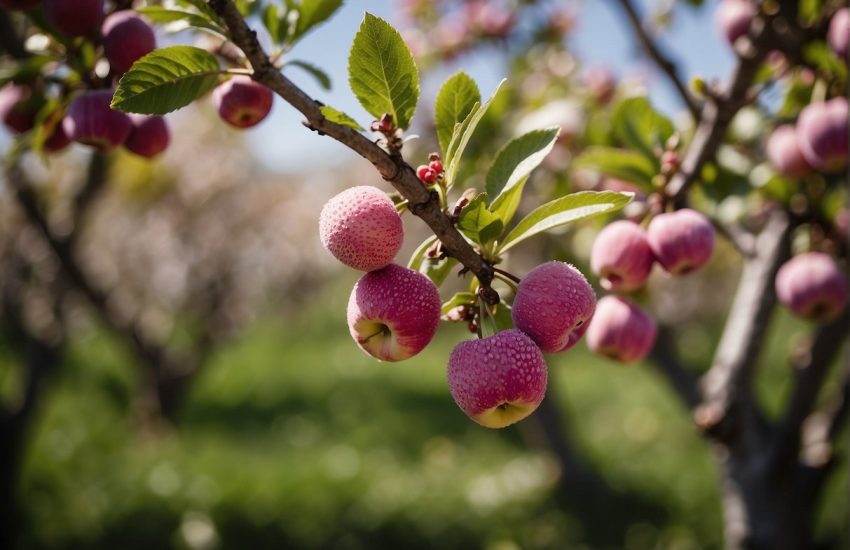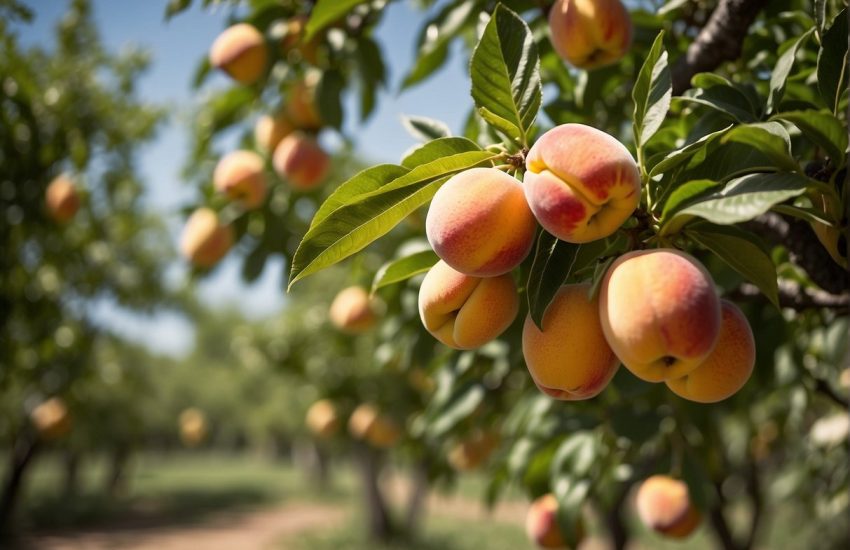Best Fruits to Grow in Tennessee: A Guide for Gardeners
Last updated: February 8, 2026
Tennessee is a state that is known for its hot summers and mild winters. Due to its unique climate and soil conditions, it can be challenging for gardeners to choose the best fruit trees to grow in their gardens. However, with proper research and knowledge of the region, it is possible to grow a variety of delicious fruits in Tennessee.

One of the best fruit trees to grow in Tennessee is the apple tree. Apples are hardy trees that can withstand the hot summers and cold winters of the state. They require well-drained soil and full sun exposure to thrive. With proper care, apple trees can produce a bountiful harvest of juicy, crisp apples that are perfect for eating fresh or using in recipes.
Another great fruit tree to consider growing in Tennessee is the peach tree. Peaches are a popular fruit in the region and can be grown successfully with the right care and attention. They require well-drained soil and full sun exposure, but also need protection from late frosts. With proper care, peach trees can produce a sweet and juicy crop that is perfect for making jams, pies, and other delicious treats.
Selecting the Right Fruit Trees for Tennessee

When it comes to growing fruit trees in Tennessee, it’s important to choose the right ones that can thrive in the state’s climate and soil conditions. Here are some key factors to consider when selecting fruit trees for your Tennessee garden.
Understanding Tennessee’s Climate and Hardiness Zones
Tennessee’s climate is generally considered to be humid subtropical, with hot summers and mild winters. However, the state’s varied topography can create microclimates that affect fruit tree growth. It’s important to know your specific hardiness zone and the average frost dates in your area to choose fruit trees that can tolerate the temperatures.
Soil Requirements for Fruit Trees
Fruit trees require well-draining soil that is rich in nutrients. Tennessee’s soil can vary depending on the region, but most soils in the state are slightly acidic. Before planting fruit trees, it’s important to test the soil pH and amend it if necessary. Adding organic matter, such as compost or aged manure, can improve soil structure and fertility.
Top Fruit Trees to Plant in Tennessee
Here are some of the best fruit trees to grow in Tennessee:
- Apple Trees: There are many apple tree varieties that can thrive in Tennessee, including Gala, Honeycrisp, and Granny Smith. Apples require full sun and well-draining soil.
- Peach Trees: Tennessee is known for its delicious peaches, and varieties such as Redhaven and Elberta are well-suited for the state’s climate. Peaches require a well-draining soil and regular pruning.
- Pear Trees: Asian pears and European pears can both grow well in Tennessee, as long as the soil is well-draining. Varieties such as Bartlett and Kieffer are popular choices.
- Cherry Trees: Sweet cherries can be difficult to grow in Tennessee, but sour cherries such as Montmorency can thrive. Cherries require well-draining soil and full sun.
- Fig Trees: Figs are a great option for Tennessee gardeners, as they are drought-tolerant and can grow well in a variety of soil types. Varieties such as Brown Turkey and Celeste are popular choices.
- Persimmon Trees: Native persimmon trees can be found throughout Tennessee, and non-native varieties such as Fuyu and Hachiya can also grow well. Persimmons require well-draining soil and full sun.
- Apricot Trees: Apricots can be challenging to grow in Tennessee, but varieties such as Goldcot and Moorpark can thrive in well-draining soil. Apricots require full sun and regular pruning.
- Plum Trees: Japanese plums and European plums can both grow well in Tennessee, as long as the soil is well-draining. Varieties such as Methley and Stanley are popular choices.
Planting and Caring for Your Fruit Trees
Best Planting Practices
When planting fruit trees in Tennessee, it is important to choose the right location. Fruit trees need at least six hours of direct sunlight each day to thrive, so choose a spot that gets plenty of sun. The soil should be well-draining, and the pH level should be between 6.0 and 7.0. It is recommended to plant fruit trees in the spring or fall, when the soil is moist and temperatures are mild.
When planting, dig a hole that is twice as wide as the root ball and just as deep. Remove any rocks or debris from the soil, and mix in some organic matter such as compost or aged manure. Place the tree in the hole, making sure the graft union is above the soil line. Fill in the hole with soil, and tamp it down gently with your foot. Water the tree thoroughly after planting.
Watering and Fertilization
Proper watering is essential for the health of your fruit trees. Young trees should be watered deeply once a week, while mature trees need about one inch of water per week. During periods of drought, it may be necessary to water more frequently. It is important to water the trees at the base, rather than from above, to prevent fungal diseases.
Fertilization is also important for fruit trees. Apply a balanced fertilizer, such as a 10-10-10 or 12-12-12 formula, in the spring before new growth appears. Avoid fertilizing in the fall, as this can encourage new growth that will not have time to harden off before winter.
Pruning and Maintenance
Pruning is necessary to keep fruit trees healthy and productive. Prune in late winter or early spring, before new growth appears. Remove any dead or diseased wood, as well as any branches that are crossing or rubbing against each other. Thin out the interior of the tree to improve air circulation and sunlight penetration.
Mulching around the base of the tree can help retain moisture and suppress weeds. Use a layer of organic mulch, such as wood chips or shredded leaves, and keep it a few inches away from the trunk to prevent rot.
By following these planting and care practices, you can enjoy a bountiful harvest of delicious fruit from your Tennessee fruit trees.
Protecting Fruit Trees from Pests and Diseases

Growing fruit trees in Tennessee can be a rewarding experience, but it can also be a challenge due to the prevalence of pests and diseases. Protecting your fruit trees from these threats is essential to ensure a bountiful harvest.
Common Pests and How to Manage Them
Pests such as aphids, mites, and fruit flies can cause significant damage to fruit trees. One effective way to manage these pests is by using natural predators, such as ladybugs and lacewings. These predators can be purchased online or at local gardening stores and released onto your fruit trees.
Another effective method is to use organic insecticides, such as neem oil or insecticidal soap. These products are safe for humans and pets and can be applied directly to the fruit trees. It is important to follow the instructions carefully and not to overapply the insecticides, as this can harm the fruit trees.
Disease Prevention and Control
Fruit trees are susceptible to various diseases, such as apple scab and powdery mildew. To prevent these diseases, it is important to keep the fruit trees healthy by providing them with adequate nutrients and water. Pruning the fruit trees regularly can also help to improve air circulation and reduce the risk of disease.
In addition, applying fungicides can help to prevent and control diseases. Copper-based fungicides are effective against many fruit tree diseases and can be applied during the dormant season. It is important to follow the instructions carefully and not to overapply the fungicides, as this can harm the fruit trees.
It is also important to keep an eye out for signs of root rot, which can occur when the soil around the fruit trees is too wet. To prevent root rot, ensure that the soil is well-draining and avoid overwatering the fruit trees.
By taking these steps to protect your fruit trees from pests and diseases, you can ensure a healthy and fruitful harvest.
Harvesting and Enjoying the Fruits of Your Labor

Once the fruits have ripened, it’s time to harvest them. Most of the fruits grown in Tennessee are ready to be harvested in the summer and fall. The harvest season usually starts in early June and lasts until late October.
When harvesting fruits, it’s important to pick them at the right time to ensure they are at their peak flavor and texture. For example, peaches should be picked when they are fully ripe and slightly soft to the touch. On the other hand, apples should be picked when they are firm and before they start to fall off the tree.
After harvesting, it’s time to enjoy the tasty fruits of your labor. Many of the fruits grown in Tennessee can be enjoyed fresh, but they can also be used to make jams, jellies, and other preserves.
If you have a heavy harvest, consider sharing your bounty with friends and family or donating it to a local food bank. It’s a great way to spread the joy of fresh, locally-grown fruits while also supporting your community.


